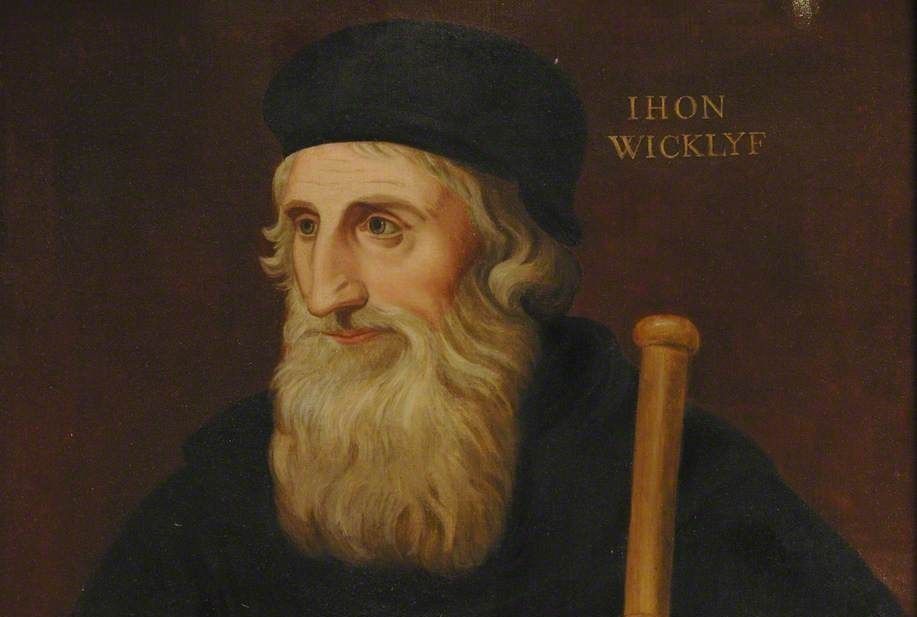John Wycliffe: The Morning Star of the Reformation
... the Gospel of Christ is the whole body of God’s law…

Key words
- The Reformation: the 16th-century religious ideas and activity in Europe that resulted in Protestant Churches being established
Wycliffe made the Reformation possible.
- Papacy: the position or authority of the pope
They wrote about the private life of the pope, not his public life in the institution of the papacy.
- Compelled: having to do something, because you are forced to or feel it is necessary
He felt compelled to report the incident.
- Chaplain: a Christian official who is responsible for the religious needs of an organization
The prison chaplain patiently listened to the prisoners complaints.
- Sacrament: an important religious ceremony in the Roman Catholic Church
The Roman Catholic Church has seven sacraments.
Read the article to find the answers
- What did John Wycliffe accuse Rome of?
- Who was he chaplain to?
- Did the Pope in Rome have the authority to demand money from the King of England?
- What did the Roman Catholic Church want to do to Wycliffe?
Wycliffe's Bible
In the 14th century, the Bible was only available in Latin, the language of the Church at that time. John Wycliffe, an English theologian and professor at Oxford University, believed that the Bible should be accessible to all people, not just the clergy. He was the first person to translate the Bible into Middle English, making it more accessible to the common people.
Wycliffe's efforts laid the groundwork for later translations of the Bible into English, such as the work of William Tyndale and the King James Version. His views on the beliefs and practices of the Church also influenced the Protestant Reformation, earning him the title 'Morning Star of the Reformation'.
A war of minds
There was a war of ideas between the religious leaders in Rome and John Wycliffe in England. Wycliffe was highly respected for his intelligence and knowledge, and served as chaplain to the King of England. He used the Bible to show the King that the Pope in Rome had no authority to demand money from him, so the King rejected the Pope's demand and refused to pay. Wycliffe's main aim, however, was not to save money, but to turn people's hearts and minds away from Rome and towards the Bible.
The papacy hated Wycliffe's growing influence and told everyone he was a heretic who should be burnt alive. In response, Wycliffe formed a group of preachers who travelled around England sharing his version of the Bible with as many people as possible. At the same time, he continued to preach at the university and translated the Bible into English so that everyone could read it for themselves.
Wycliffe completed the first-ever English translation of the Bible, highlighting the passages that taught that salvation came through faith in Jesus Christ, not through the sacraments. He dedicated his life to using the Bible as a powerful weapon against Rome. His preachers spread his work throughout England, converting nearly half the country.
The authority of the Bible
The Pope tried to stop the spread of the English translation of the Bible and later passed laws banning it. Wycliffe responded with a letter contrasting the Pope's proud behaviour and extravagant lifestyle with the humility of Jesus Christ. He told the pope that the Bible had authority over Rome, and pointed out that each individual could learn how to live rightly by studying it for themselves without the help of the papacy.
Wycliffe had laid the foundations for the Reformation to come. His teachings continued to spread after his death, influencing others such as John Huss in Bohemia.
Many of the reformers who emerged in the centuries leading up to the Protestant Reformation believed that the papacy was a corrupt institution that had deviated from the teachings of the Bible, and some, based on interpretations of the Book of Revelation, even believed that it was the Antichrist.
Discussion questions
- Do you have any questions about any of the vocabulary or grammar in this article?
- What do you know about the history of the Roman Catholic Church?
- Who translated the Bible into your first language?
- Has anyone been punished for translating books in your country?

Book a Lesson
Improve your English language communication skills by practicing with a qualified and experienced native speaker.





